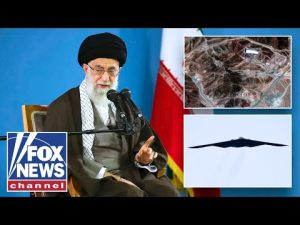In a dramatic update, as if pulled straight from the pages of a spy thriller, the Secretary of Defense has dropped a bombshell of his own regarding the recent airstrikes on Iran’s nuclear facilities. According to his statement, these strikes were not merely a slap on the wrist but a decisive blow that has allegedly obliterated Iran’s capacity to manufacture nuclear weapons. As one might guess, these remarks come amid a swirl of back-and-forth reports and skepticism, with some unnamed skeptics suggesting perhaps the setbacks to Iran’s nuclear ambitions were merely short-term. However, according to the Defense Secretary, those critics are about as reliable as a rain dance in the desert.
While the Secretary of Defense paints a picture of perfection, other voices aren’t entirely convinced. As always, it’s a mixed bag. You have a retired Army General chiming in, praising the surgical precision of the strikes and the fact that they were carried out without any casualties among Coalition forces. This is painted as a significant achievement, and indeed, in military operations of this magnitude, one can certainly tip their hat to this kind of efficiency. Yet, as any good detective knows, there are always loose threads. Just like in an old movie, the true extent of the damage remains under wraps until we get through the rubble, which is never as quick or easy as in the movies.
There are some serious concerns about whether highly enriched uranium and crucial equipment might have found new homes before the strikes hit. It’s like trying to shut down a burger joint that might have already gone franchise without needing much oversight. Surely no one wants a rogue element wandering about with uranium stockpiles as if they were part of a sinister basement store club. The need to account for every speck of material is vital, otherwise, it risks being used in unsavory ways. Talk about the need for a robust inventory system!
Meanwhile, as this international plot unfolds, the specter of clandestine operations looms large. Intel and inspections, or rather the lack thereof in some instances, are cause for a dramatic pause. Iran’s apparent reluctance to open its doors to inspectors seems to be playing into fears and allows shadows to play tricks. We all want to believe in the intrepid spies and the wisdom of international inspectors solving mysteries, but without access, the plot thickens.
As the world watches this international chess game, it begs the question of whether peace can indeed be maintained without full transparency from Iran. Sure, there are talks of sanctions and intelligence gathering, which sound like great tools, but one can’t help but wonder if they will be enough to keep everyone playing nice. Only time will tell if this will be a chapter that closes with success or if it’s merely the cliffhanger to a gripping saga.







